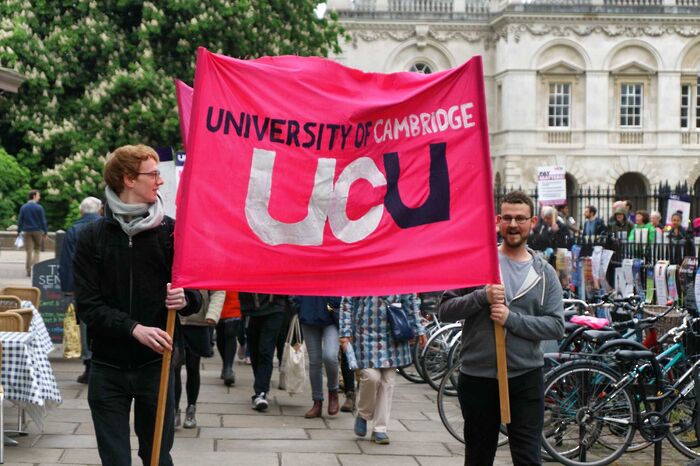Cambridge staff not to strike over pay, following insufficient turnout in UCU ballot
69.8% of UCU members in England, Wales and Scotland voted in favour of strike action, although voting failed to reach the 50% turnout threshold

Cambridge academics will not be striking over pay next term, it was announced today, following the results of the University and College Union’s (UCU) ballot. The turnout of 41% did not reach the required threshold.
69.8% of UCU members in England, Scotland and Wales voted in support of strike action, while 80.5% backed action short of a strike up to and including a marking boycott.
The turnout of 41% falls below the 50% turnout threshold legally required before unions can take strike action, due to legislation introduced under the Trade Union Act of 2016.
Sam James, President of the University of Cambridge’s branch of UCU (CUCU) told Varsity that the threshold legislation of 2016 “has in this case achieved its purpose of preventing workers from defending their interests through collective action”.
However, he argued that there was “a considerable increase” in turnout among Cambridge UCU members to this ballot, “with our [their] own data collection and modelling indicating a local turnout between 55% and 60%”.
The strikes were planned to protest insecure contracts, excessive workloads, and a fall in staff pay, which has dropped by 21% in real terms since 2009. They were also planned to protest the gender pay gap, which James said has “increased in Cambridge this year”.
This ballot comes from the UCU’s decision from a special higher education conference on pay in November, following an insufficient turnout for a similar ballot last term, which resulted in no strike action. The ballot saw 79.6% of CUCU members vote in favour of striking, with a turnout of 48.1%.
James warned that the ballot turnout “should leave the University administration under no illusions about the will to take action in Cambridge”, as the issues of pay, precarity, workload and gender pay gap “are not going away”.
He also recognised the “ongoing support” of students, telling Varsity that they “clearly understand” the “driving down of working conditions in higher education can only harm their own and future students’ education[s]”.
Meanwhile, CUCU have recently placed two local claims with the University on “central issues at stake in the ballot”: one involves reducing the gender pay gap, which stood at a mean of 19.6% in 2017, when the higher education sector average is around 12%, and the other involves improving pay and conditions for precarious staff. He added that the association “trust[s] that the strong support for strike action in Cambridge will help focus the administration’s minds as they respond to both claims”.
UCU’s negotiators will meet on 25 February to consider the union’s approach to the 2019-20 pay round - a further update will be provided to the UCU members following this meeting.
James told Varsity that CUCU “will now move forward with renewed determination to work for a fairer and better University”. He further stated that “employers must realise that the patience of staff is not exhaustible”.
 Interviews / You don’t need to peak at Cambridge, says Robin Harding31 December 2025
Interviews / You don’t need to peak at Cambridge, says Robin Harding31 December 2025 News / Unions protest handling of redundancies at Epidemiology Unit30 December 2025
News / Unions protest handling of redundancies at Epidemiology Unit30 December 2025 Comment / What happened to men at Cambridge?31 December 2025
Comment / What happened to men at Cambridge?31 December 2025 Features / ‘Treated like we’re incompetent’: ents officers on college micromanagement30 December 2025
Features / ‘Treated like we’re incompetent’: ents officers on college micromanagement30 December 2025 Theatre / We should be filming ADC productions31 December 2025
Theatre / We should be filming ADC productions31 December 2025








